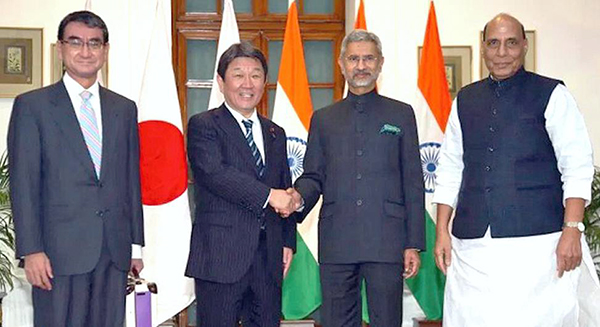India and Japan have a long linkage of friendship based on goodwill and trust. A major reason for this trust and goodwill is no historical baggage between the two countries. The growth of friendship has progressed from cultural relations to strategic relations and off late worked extensively on Defence relations in 2019. This partnership between India and Japan has been a dependable bond as both have supported each other in the best possible way. Therefore, this article traces the highlights of the dependable bond between India and Japan.
India and Japan have a deep sense of spiritual affinity ad this was documented when historically a direct contact with Japan was traced to Todaiji Temple in Nara where the consecration or the eye-opening of towering statue of Lord Buddha was performed in 752AD by Bodhisena, an Indian monk. In the beginning of 1870’s, Indians arrived in Japan for business and commercial interests in Yokohama and Kobe, the two major open ports centres and later during the First World War too, many Indians entered Japan to fill the gaps and demand for the Japanese products. In the contemporary times, many of the prominent Indians are associated with Japan like Swami Vivekananda, Gurudev Rabindranath Tagore, JRD Tata, Netaji Subhash Chandra Bose and Judge Radha Binod Pal. In 1903, the Japan-India Association was formed and has been the oldest international friendship body in Japan. After the 1923 Kanto Earthquake, most of Indians in the community moved to Kansai region consisting of Osaka and Kobe and city has the largest migrant Indian population in Japan. The old Indian community was involved in trade of textiles, commodities, electronics and jewelry. Japan had welcomed the Indian community with open arms and the cultural and spiritual ties only paved way for stronger historical and cultural relations between the two countries and aimed for a dependable bond.
ALSO READ India holds naval exercise with Japan amid stand-off with China
The dependable relations continued between these two nations even after the Japan had surrendered to the U.S. and in 1949, Indian Prime Minister Jawaharlal Nehru donated an Indian elephant to Japan at the Ueno Zoo in Tokyo which was a ray of hope in the lives of the Japanese people who were still trying to recover from the defeat in the war. On 28 April 1952, India and Japan signed a peace treaty and established diplomatic relations and this peace treaty signed with India was first of a kind after the Second World War. This gesture by both the countries was yet again a signal of dependability amongst each other.
A major highlight was in 1958 when Japan provided yen loans to India and later in 1983; Suzuki Motor Corporation began to manufacture cars in India. In August 2000, Prime Minister Yoshiro Mori visited India and strengthened the momentum of the relationship and with Prime Minister Atal Bihari Vajpayee established the ‘Global Partnership between Japan and India. India became important for Japan in 2000 due to its common concern over China. China emerged as a reason for security cooperation between India and Japan as the issues on the Indo-China border and Senkaku Islands in the East China Sea and this started a whole new level of dependable relations between India and Japan.
Another major change was in 2007, when Prime Minister Shinzo Abe in the Indian Parliament gave his speech ‘Confluence of Two Seas was aiming at Japan’s Broader Asia with its focus on the Indian Ocean and Pacific Ocean’ and this also paved way for the Quadrilateral Security Dialogue (Quad). On 25 April 2007, for the “first time, the Indian Navy, JMSDF and the U.S. Navy conducted their first multilateral exercise called Trilatex-07 in the Pacific region” and this was followed by the “Joint Declaration on Security Cooperation between India and Japan” and “Recognizing that Japan and India share common interest in the safety of sea lines of communications” in 2008. All this paved a new stage of ‘maritime relations’ which was yet again a result of dependable ties along with China as a common cause of security cause for both.
In January 2014, Japan had asked India to gorge a team to thwart Chinese expansionist in the regions of the East China Sea and the Himalayas. Japan had called for a united opposition to Chinese activities and moves which came in the backdrop of China’s unilateral move to change the status quo in the East China Sea and imposed the Air Defence Identification Zone (ADIZ). Itsunori Onodera, the Defence Minister quoted “Both Japan and India should ask for a dialogue with Chinese side and tell China not to change status quo by force. These issues should be solved through dialogue and following international rules.” This was yet gain a stage where India an all-weather friend of Japan proved its friendship and dependability in their ties.
ALSO READ INDIA-JAPAN: Immense Potential in Post-Covid Partnership
Indo-Pacific
The other major change was in the ‘Indo-Pacific realm’ in 2015, when the “Joint Statement on India and Japan Vision 2025: Special Strategic and Global Partnership Working Together for Peace and Prosperity of the Indo-Pacific Region and the World” and the “vision was for a deep, broad-based and action-oriented partnership and also aimed for a peaceful open, equitable, stable and rule-based order in the Indo-Pacific region and beyond” and later in 2016, Prime Minister Shinzo Abe announced the “Free and Open Indo-Pacific Strategy” (FOIPs) in Kenya and spoke about the two continents, Asia and Africa and the two oceans, Indian and Pacific Ocean and the need to develop a free and open Indo-Pacific region. This was a major decision as India was already working on its ‘Act East Policy’ (AEP) and soon with the Japan’s ‘Indo-Pacific Vision’, India’s Act East Policy aimed towards Indo-Pacific as China was a major threat in the Indo-Pacific region whether in the Indian Ocean, East China and the South China Sea and yet again, it paved the way for dependable relations.
In 2017, the Doklam Issue, India had asked China to respect the 2012 understanding where “no country would alter the status quo unilaterally in the eastern sector of India-China border.” It was then that the Japanese Defence Minister quoted “For both India and Japan, China is an important neighbouring country. Both countries have important economic linkages with China. However, after the recent Chinese provocative actions, entire international community will have to send a message to China.” Also, around the same, the then Japanese Ambassador Kenji Hiramatsu quoted “no country should try to change the status quo in Doklam. China has been insisting on constructing a highway through Doklam area of Bhutan claiming it to be its own territory.” This support to India proved that yet again the relations between these nations are dependable and keep moving in greater direction.
2+2 Ministerial Meeting
On 30 November 2019, the First Japan-India 2+2 Foreign and Defence Ministerial Meeting was held New Delhi and this meeting aimed to enhance the strategic depth of bilateral security and defence cooperation. They also welcomed the second “Dharma Guardian-2019” and the second “Shinyuu Maitri-2019” which was followed by the coordination for the first Japan-India joint fighter aircraft exercise in Japan. They also aimed to further strengthen the defence equipment and technology cooperation and looked forward to productive discussions in the fifth Joint Working Group on Defence Equipment and Technology Cooperation (JWG-DETC) and also welcomed the progress on cooperative research in the area of Unmanned Ground Vehicle (UGV)/Robotics. It is important to understand that this kind of meeting has taken place as India and Japan feel that they both can trust and depend on each other in the realm of defence cooperation which is yet again a major milestone in this relationship.
The recent stand-off between India and China in the region of Ladakh where Chinese tried to aggressively take and claim a part of Ladakh, which is a territory of India, created a major problem. Japan proved its friendship and dependability as an all-weather friend as the Japanese Ambassador to India Satoshi Suzuki quoted that “the country opposes any unilateral attempts to change the status quo”. Also, in a rare briefing on 25 June 2020, the Japanese Defence Minister Taro Kono opined that “the Chinese military capabilities and intentions needed to be watched closely across Asia”. On 27 June 2020, “JS Kashima and JS Shimayuki, the JMSDF Training Squadron, conducted an exercise with INS Rana and INS Kulish, Indian Navy at the Indian Ocean and this exercise was aimed to promote mutual understanding, tactical training and communication training”. “The Japanese Navy and the Indian Navy have been instrumental in paving the way for stronger relations between the two countries and this exercise is the 15th exercise in the last three years.” This exercise gained a lot of importance as India and Japan supported one another in the Indian Ocean and was a clear answer to China to back off as China has been trying to take control of the Indian Ocean.
Maj Gen GD Bakshi in a personal interview quoted “we should make a commitment that if any country uses or threatens to use nuclear weapons against Japan, India will take steps to counter the threat”. Maj Gen Bakshi further quoted that “India and Japan need to deepen the security ties and we could jointly manufacture next generation stealth fighters, tanks and anti-submarine frigates and mine sweepers.”
Conclusion
India and Japan have always proved to a dependable set of friends who support each other and voice each other’s concern regionally and globally. India and Japan is in my opinion the only friendship between two democracies successful and even with vested interests both the nations mutually respect and maintain the trust and goodwill amongst one another. Also, this dependability is realist world is rather impossible but they still provide their friendship as an example of an exemplary bond undeterred by even superpowers like China.













